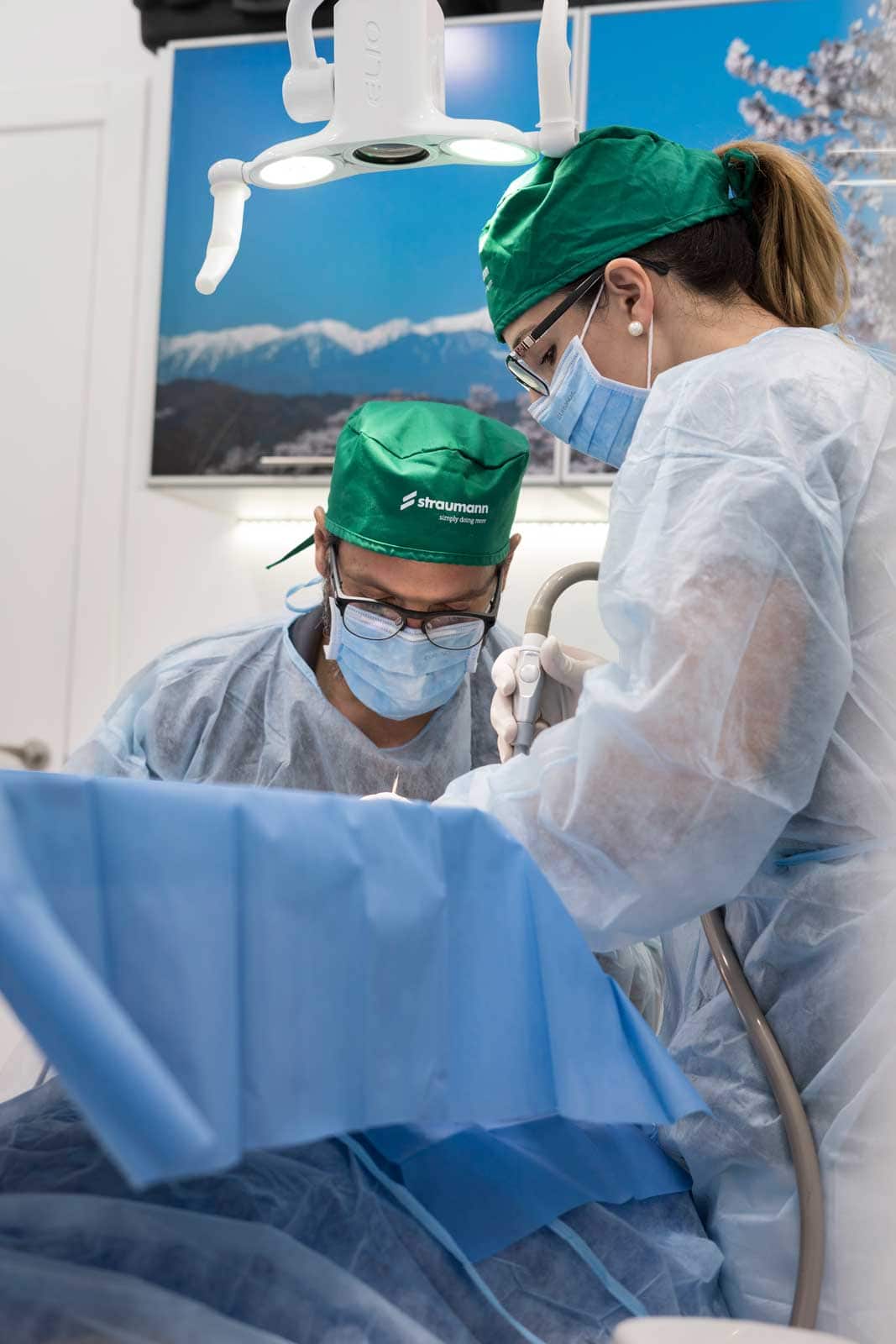DENTAL IMPLANT TREATMENT
Dental Implants Malaga
Choose Clinica Dental Herrera as your dental implant specialist in Malaga for dental implants.

One of the most effective ways to replace missing teeth without having to resort to dental bridges or dentures are dental implants.
These implants are specifically designed to replace the root and the missing tooth with an artificial ceramic piece similar in shape to our original teeth.
This technique is considered to be one of the main advances in dental implantology in the last decades and the application of the latest techniques in laser-guided dental surgery in Malaga allows us to effectively improve dental aesthetics and recover all the masticatory functions of our patients caused by the loss of one or more teeth.
Due to our high success rate the number of patients who choose Clínica Dental Herrera as their dental implant specialist in Malaga for the placement of dental implants is increasing every day.
Dental Implant Malaga, what does it consist of?
An implant is usually made up of three parts joined together to make it firmly attached to the patient’s jaw or maxilla:
The first part to be surgically placed will be a metal screw with a cylindrical or conical shape (generally made of titanium) that is biocompatible with our organism and which will serve to replace the root of the missing tooth that will be attached by means of the abutment or core to a ceramic dental crown that will look similar to a natural tooth.
How are dental implants in Malaga placed?
Dental implants are specially designed to firmly attach to the patient’s jaw structure in a three-stage process with the ultimate goal of restoring the original function of the tooth within 3 to 6 months.
During the initial phase of treatment the patient will undergo a series of analyses and a 3D scan to determine the amount of bone available, the position, inclination and size of the implant.
These preliminary analyses will also help us to detect any other type of medical complication or infection that the patient may suffer from to be treated before the intervention.
After verifying that these previous analyses are correct, a provisional prosthesis will be surgically placed, which after the healing period of the intervention will be replaced by a definitive dental crown.
The second phase of the treatment is the most important of the whole process as this is when a natural process of integration of the titanium prosthesis with the bone takes place, called osseointegration. This process can last for a period of two to three months and once it has elapsed it will give the implant greater support and firmness.
In the event of rejection by the patient’s body, the implant will be removed and the affected area will be cleaned so that the whole process can be repeated again.
The third and final phase will take place when the integration of the prosthesis with the bone is completely finished and the healing period has concluded satisfactorily, after which a definitive dental crown will be fitted.
How much does a dental implant in Malaga cost?
The prices of dental implants in Malaga usually vary depending on the complexity of the treatment and its placement, as the price will vary depending on whether it will be placed in the upper or lower jaw.
If you would like a more detailed quotation you can contact Clínica Hermanos Herrera where we will inform you of the best prices for dental implants in Malaga.
Types of dental implants Malaga
Depending on their placement, dental implants can be of two types:
- Endo-osseous implants
These types of implants are the most common and consist of placing a screw in the bone by surgery as we have already seen above and are the best alternative for those patients who need a bridge or those who already use a removable prosthesis.
- Subperiosteal or Juxta-osseous Implants
This type of implants are less common than the previous ones and are especially indicated for those patients whose bone density is lower than that indicated for the application of endosseous implants.
How long can they last?
The useful life of a dental implant is usually around 20 years on average and can even exceed this period of time as long as we take proper care of it as recommended by our dentist and maintain proper dental hygiene both at home and in the clinic.
















Advantages and risks of using a dental implant
Once the dental implants have been successfully placed without being rejected by our body, the implants will provide us with a series of advantages that will improve our quality of life:
- Dentition with a natural and healthy appearance.
- We will recover the ability to chew and grind food, improving our digestion.
- Increased self-esteem by improving the appearance of our teeth.
- Better pronunciation when speaking or singing.
- Balance in the wear and tear of the teeth when chewing, as when we are missing a tooth we tend to force the opposite side more when chewing to compensate for the lack of teeth.
- Reduction of bone and gum loss.
- Greater prevention in the appearance of caries.
- We will avoid the displacement of the rest of the teeth to occupy the space left by the missing tooth.
- Reduction of discomfort and swelling of the gums caused by the rubbing of removable dentures.
There are some uncommon potential risks or discomforts that may occur after dental implants such as:
- In some patients, it is possible that during the weeks following implantation, the body may reject the implants, which may cause them to move or fall out.
- If an implant of the right size is not used, it may cause itching of the lips and gums, which can lead to nerve damage.
- Minimal risk of suffering an infection or discomfort after the operation, for which antibiotics and painkillers will be administered.